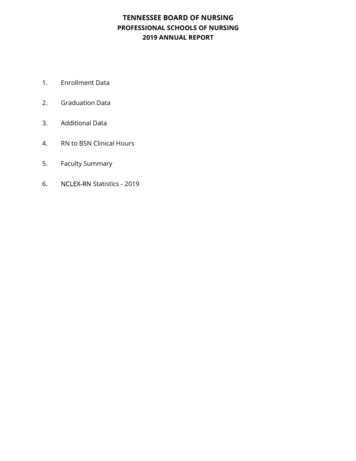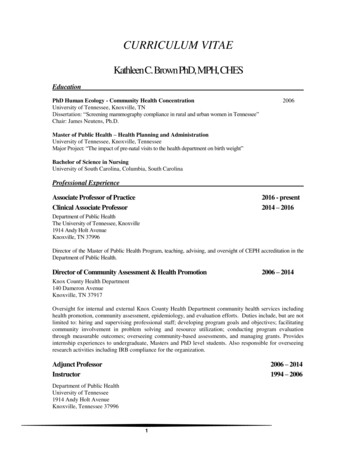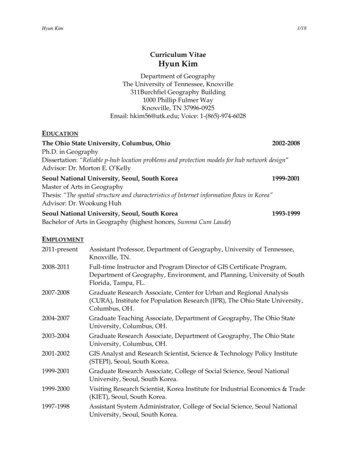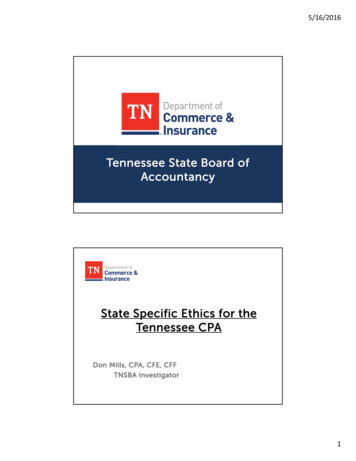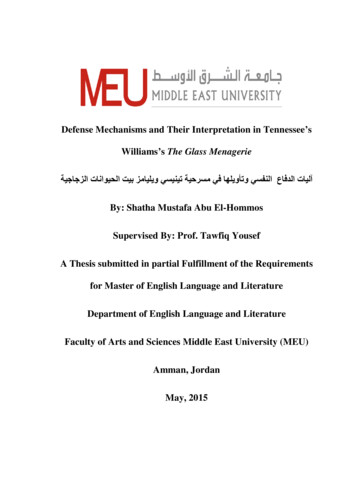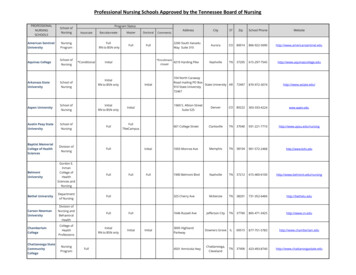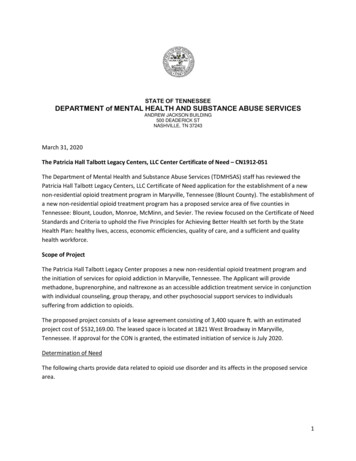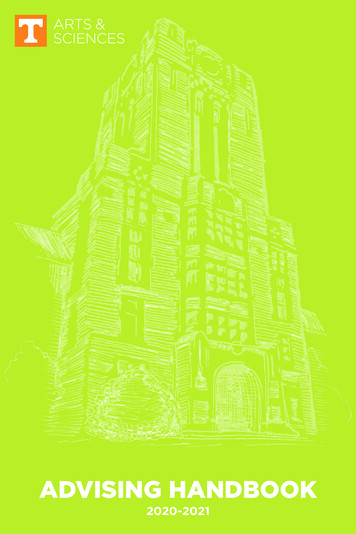
Transcription
ADVISING HANDBOOK2020-2021
All qualified applicants will receive equal consideration for employment and admission withoutregard to race, color, national origin, religion, sex, pregnancy, marital status, sexual orientation,gender identity, age, physical or mental disability, genetic information, veteran status, andparental status. In accordance with the requirements of Title VI of the Civil Rights Act of 1964,Title IX of the Education Amendments of 1972, Section 504 of the Rehabilitation Act of 1973,and the Americans with Disabilities Act of 1990, the University of Tennessee affirmatively statesthat it does not discriminate on the basis of race, sex, or disability in its education programsand activities, and this policy extends to employment by the university. Inquiries and charges ofviolation of Title VI (race, color, and national origin), Title IX (sex), Section 504 (disability), theADA (disability), the Age Discrimination in Employment Act (age), sexual orientation, or veteranstatus should be directed to the Office of Equity and Diversity, 1840 Melrose Avenue, Knoxville,TN 37996-3560, telephone 865-974-2498. Requests for accommodation of a disability shouldbe directed to the ADA Coordinator at the Office of Equity and Diversity.PAN E01-1001-007-002-20 CAS JOB 20-029
Welcome to theCollege of Arts and Sciences:PLANNING FOR YOUR FUTUREDean’sMessageOur mission in the College of Arts andSciences is to cultivate in our studentsthe critical thinking skills, intellectualinquiry, and understanding of diversehuman cultures that are necessary tobecome an engaged global citizen.The College of Arts and Sciences isthe gateway to knowledge for everyundergraduate student enrolled atthe University of Tennessee, Knoxville. Our faculty provide thefoundational instruction to help you put down roots that will nurtureyour lifelong learning. When you graduate, you will be prepared topursue a variety of careers in the global community.Our goal in Arts and Sciences Advising Services is to guideundergraduate students in developing and implementing soundeducational plans. We are here to help ensure that your plans areconsistent with your values and your academic and career goals.Our purpose is to encourage you to become self-directed learnersand decision-makers.- Theresa M. LeeThe College of Arts and Sciences is UT’s flagship college and thelargest, most comprehensive, and most diverse of UT’s eleven colleges.As such, our faculty are a central driver of the university’s academicaccomplishments and the greatest contributor to all aspects of theuniversity’s missions of instruction, research, and service to society.This catalog expires in six catalog years. See your advisor for details.
HOW TOSchedule an Advising AppointmentNavigate is a portal through which students can schedule appointmentswith academic advisors. To schedule an appointment via Navigate,please do the following: Log-in to your myUTKScroll down to the “Student Success” sectionClick on the “Navigate” linkOnce in Navigate, click on the link for “Appointments for Advising orOther Academic Help”After that, follow the on-screen instructionsIf you have issues, visit our website to read through the FAQ section.tiny.utk.edu/howtoscheduleYou are also welcome to schedule an appointment by calling our office at865-974-4483 or by visiting the primary Arts & Sciences Advising office inAyres Hall, room 313.NOTES TO REMEMBER When you make an appointment, you should always receive anemail confirmation. If you did not receive a confirmation, then theappointment was NOT scheduled. If you are late to your appointment, you will have to reschedule. Each Wednesday, more appointments are made available. We onlyhave two weeks of availability at any given time. If you try to schedulemore than two weeks out, you will see “N/A” instead of availableappointment times. Check back on Wednesdays. Reports and academic plans made with your advisor can be found onyour profile in Navigate under the “Reports/Notes” tab. If you have a quick question for your advisor, you are welcome to sendthem an email at any time. However, please allow 1-2 business days forthem to respond.
TABLE OF CONTENTSACADEMIC ADVISING TERMS 2ADVISING: THE VOLUNTEER EXPERIENCE5ARTS AND SCIENCES ADVISING SERVICES6THE ADVISING POLICY 6YOU AND YOUR ADVISOR 7ADVICE FROM YOUR ADVISOR 8SUGGESTIONS TO ENSURE DEGREE PROGRESSION8THE EXPLORATORY STUDENT 9ACADEMIC AND CAREER PLANNING 10ACADEMIC POLICIES 14SPECIAL PROGRAMS 18DEGREES AND PROGRAMS 21B.A. AND B.S. DEGREE REQUIREMENTS27ADVANCED PLACEMENT 30INTERNATIONAL BACCALAUREATE 32ARTS & SCIENCES CURRICULUM 33FOUNDATIONS: 33FIRST YEAR ENGLISH COMPOSITION 33COMMUNICATING THROUGH WRITING34COMMUNICATING ORALLY 39QUANTITATIVE REASONING 40PERSPECTIVES: 41ARTS AND HUMANITIES 41NATURAL SCIENCES 44SOCIAL SCIENCES 45FOREIGN LANGUAGE 47NON-US HISTORY 50GLOBAL CHALLENGES 50CONNECTIONS 53RESOURCES FOR STUDENTS 66COLLEGE AND DEPARTMENT DIRECTORY68NOTE PAGE 711
ACADEMIC ADVISING TERMSACADEMIC HISTORY: An unofficial record of a student’s attempted coursework from allinstitutions attended. Students can access this information through the myutk.utk.eduportal.ACADEMIC PLAN: A planning worksheet used to outline remaining course requirementssemester by semester. Varies by college.ACADEMIC PROBATION ADVISING: A status that indicates a student is in academicdifficulty. Students are placed on academic probation when either their cumulative GPAfalls below 2.00 or their semester GPA falls below 2.00 for two consecutive semesters,regardless of their cumulative GPA. While on Academic Probation, a student mustparticipate in a special advising session in Arts & Sciences Advising Services. See the UTUndergraduate Catalog (catalog.utk.edu), or ask your advisor for further details.ACADEMIC YEAR: The part of the year that includes the fall and spring semesters.ADD SLIP: The form used for adding a closed or restricted course when an authorizingsignature is required. For example, to add a closed course, both the instructor’s and thedepartment head’s signatures are needed. The form is found at onestop.utk.edu/classregistration/add.CRN: Course registration number. A five digit number that uniquely identifies eachindividual class in a semester.CATALOG: This online publication contains all academic policies and procedures,college and degree requirements, faculty, and course descriptions. All students areresponsible for knowing information provided in this publication. Catalogs are in effectfor 6 years.CATALOG YEAR: The year during which regulations of a specific edition of theUndergraduate Catalog apply. Students may satisfy requirements for a Bachelor’s degreeusing any catalog in effect during their attendance at the University provided the cataloghas been in effect within six years of graduation. A new catalog year begins every fallterm. Students beginning in a spring or summer semester are eligible to follow the fallcatalog for that academic year. The online catalog can be found at catalog.utk.edu.CLOSED COURSE (C): A course that is filled to capacity and has no available spaces.Special permission from the instructor and department is needed to add a closedcourse. Add slips are available at onestop.utk.edu/class-registration/add. A wait listoption is available for some courses.CONCENTRATION: A specific focus within a major; for example, English majors maychoose to concentrate in either literature or creative writing.COREQUISITE: A course to be taken, or a requirement to be fulfilled, at the same timeyou are taking a particular course.CREDIT HOURS: Refers to the number of credits or units earned by successfullycompleting a course. This is approximately equal to the number of hours the classmeets per week; also referred to as semester hours.CROSS-LISTED COURSE: A course that is offered by more than one department.COURSE LOAD: The total number of credit hours taken in a semester. The averagecourse load for any semester is 15 to 16 credit hours. Students registered for at least 12hours are considered full- time. The maximum number of hours that may be attemptedin one semester is 19 and for summer is 12. To request course overloads, permissionfrom the College is required.2
DEGREE AUDIT REPORT SYSTEM (DARS): An automated record of a student’sacademic progress toward degree completion in a major. Students can access DARSweb by signing into MyUTK at myutk.utk.edu.DEGREE PLAN: An academic planning worksheet used to keep track of projected andcompleted course requirements. Varies by college.DROP/ADD: The process of adding or removing a course or courses from a schedule.Most dropping and adding can be done using MyUTK. Drop/Add deadlines are found atregistrar.tennessee.edu.DROP POLICY: A student is allowed six drops during his/her academic career. Please readthe undergraduate catalog for additional information regarding the University’s drop policy.ELECTIVE: A course that does not fulfill a specific requirement but that may be usedtoward the total number of credit hours needed for graduation.GENERAL EDUCATION: Courses that allow a student to develop the basic skills,knowledge, attitudes, and judgements necessary for effective citizenship at all levels,local to global, for fulfilling interactions with others and the environment, and for anenriched personal life. General Education requirements are common to all UT degrees.GPA: The result of dividing the total number of quality points earned by a student bythe total number of graded credit hours of coursework the student has attempted. GPAcalculators can be found at onestop.utk.edu/gpa.GRADING SCALE: UT’s grading scale is a 4-point scale consisting of letter grades A, A-,B , B, B-, C , C, C-, D , D, D- and F, with an A worth 4 quality points and a F worth 0quality points.INCOMPLETE (I): An “I” is assigned under extraordinary circumstances and only atthe discretion of the instructor when a student whose work is satisfactory has notcompleted some portion of a course. The grade “I” is not computed into the student’sGPA. The terms for the removal of “I”, including time limit, will be decided by theinstructor. Students should never re-enroll in a course in which an “I” was awarded.LOWER DIVISION (LD): Courses on the 100- or 200- level that cover introductory content.MAJOR: A student’s principle field of study that commonly consists of approximately25% of the total credit hours needed to earn a degree.MILESTONE: In order to stay on track for a major or exploratory area, students mustcomplete minimum requirements for each tracking semester known as milestones.Milestones include successful completion of specified courses and/or attainment of aminimum GPA.MINOR: An optional secondary field of study requiring fewer credits than a major.MyUTK: Web based registration system found at myutk.utk.edu.NET ID: The first part of a student’s UT email address received once attendance at UTis confirmed. Your net ID is used each semester to register for courses, to log into yourUT email account, to sign onto Canvas, and to log into your MyUTK account.PREREQUISITE: A course to be completed or a level of skill or knowledge to bedemonstrated before you may enroll in a particular course or degree program orassociate with a particular college.3
QUALITY POINTS: The number of quality points earned for each course completed iscomputed by multiplying the value of the grade received in the course (A 4, B 3,etc.) by the number of credit hours assigned to the course. Example: an A in ComputerScience 102, a 4-credit-hour course, totals 16 quality points (4 x 4) for the work.REQUIRED ADVISING: Before registering for classes, students are required to consulteither their departmental advisor or an Arts and Sciences Advising Services advisor.For students who have earned less than 30 hours at UT, advising appointments arescheduled once each term. After 45 earned hours, students in good standing who havedeclared their majors and are on track schedule appointments once each academicyear during a designated term. More information on the advising policy can be found policy.SATISFACTORY ACADEMIC PROGRESS (SAP): This indicates your successfulcompletion of coursework towards a degree or certificate. According to federalregulations, students who fail to make satisfactory academic progress towards theirdegree or certificate will lose their ability to receive Federal Student Aid.SECTION NUMBER: A three-digit number that identifies the section of a particularcourse when multiple sections of the same course are offered.SEQUENCE: Two or more courses that must be taken in sequence. These are indicatedin this guide by a hyphen between course numbers.STUDENT ID NUMBER: Unique nine-digit number generated for students uponadmission to the University.TIMETABLE: List of all courses offered during a semester, including section numbers,times, and meeting places. You can view the timetable at MyUTK.TRANSCRIPT: The official record of a student’s coursework maintained by the Office ofthe University Registrar.UNIVERSITY/COLLEGE/DEPARTMENT: UT is composed of 9 undergraduate colleges:Agricultural; Architecture and Design; Arts and Sciences; Business Administration;Communication and Information; Education, Health and Human Sciences; Engineering;Nursing; and Social Work. Each college is divided into departments (for example,the Departments of English, Math, and Political Science are in the College of Arts &Sciences).UPPER DIVISION (UD): Courses numbered in the 300- and 400-level which cover morein-depth content.UTRACK: Universal Tracking (uTrack) is an academic monitoring system designed tohelp students stay on track for a timely graduation.WAIT LIST: Registration option on MyUTK for some courses. Allows a student to benotified via UT email when a seat is available. The student then has 24-hours, from thetime the email was sent, to add the course to their schedule.WRITING EMPHASIS COURSE: Writing emphasis courses require a at least 2,000written words, normally composed of one sustained essay or report of at least1,000 words each, plus additional writing assignments, such as in-class essay exams,journals, and book reviews. These courses help students learn course materials bydeveloping critical thinking skills, demonstrating the ability to sustain an argument, andstrengthening existing writing skills.WRITING INTENSIVE COURSE (WC): Courses designated “WC” are writing intensiveand integrate writing as a vital component of the course. Writing intensive coursesrequire a total of at least 5,000 words, with the writing taking many forms.4
ADVISING: The Volunteer Experienceartsci.utk.edu/advisingAt UT, academic advising is all about you! As a student, you’ll work withyour advisor to create an academic plan with an emphasis on self and careerexploration and opportunities for experiential learning.From orientation through graduation, you and your academic advisor will: Define your personal, educational, and career goals; Explore the general education curriculum and how those courses relateto your future major and career; Explore major and career options; Determine which university resources and programs will help you be asuccessful student; Identify co-curricular, experience learning, and leadership opportunitiesto support your academic and professional growth; and Create your personal UT academic plan.We look forward to working with you throughout your Volunteer experience,so please don’t hesitate to contact your advisor if you have any questions.5
ARTS AND SCIENCES ADVISING SERVICESThe University of Tennessee recognizes academic advising to be a criticalcomponent of the educational experience and student success. Faculty mentorsand professional staff promote academic advising as a shared responsibilitywith students. Academic advising serves to develop and enrich studenteducational plans in ways that are consistent with their personal values, goals,and career plans, preparing them for a life of learning in a global society.You will be assigned to an academic advisor before you even begin classes atUT. This professional advisor will provide an introduction to the values of theCollege of Arts and Sciences, a liberal arts education, and a broad introductionto the major discipline. By the end of your Sophomore year, you will also beassigned to a faculty mentor. The faculty mentor will provide the unique insightto the practices, opportunities, and values of your chosen discipline as they workwith you to refine your academic plan and your career plans.THE ADVISING POLICY:Prior to enrolling for the first time at the university, all degree-seeking first-yearstudents and transfer students are required to meet with an academic advisor.Readmitted students must also meet with an academic advisor priorto reenrolling. Advising policies vary by college. Information in this guiderefers to the advising policy for the College of Arts and Sciences. Forinformation about advising policies for other colleges, please refer to theAdvising Center for that college. All students with fewer than 45 hours at UT KnoxvilleStudents following Exploratory tracksStudents identified as “off track” by uTrackStudents on Academic ProbationAll other students are required to consult with an advisor for a substantialconference during a designated semester each year. Students whose ID numbers end in an even digit are required to meetwith an advisor during fall semesterStudents whose ID numbers end in an odd digit are required to meetwith an advisor during spring semesterAll students are encouraged to consult with their advisors at any time.The student, not the advisor, bears the ultimate responsibility for educationalplanning, selecting courses, meeting course prerequisites, and adhering topolicies and procedures. Assistance to students with academic problems orquestions is provided by professors, advisors, department heads, and collegedeans or advising centers.6
ARTS AND SCIENCES ADVISING:You and Your AdvisorAs a UT student: I will discuss my experience at UT with my advisor.I will understand that advising is a joint responsibility with my advisorand that I am responsible for making academic decisions.I will reflect on my strengths, interests and values as I co-create myacademic plan with my advisor.I will use the tools my advisor provides me to prepare for each advisingsession and follow through on referrals made at subsequent appointments.I will know curricular requirements, academic standards, and academicmilestones related to my intended/chosen academic program in order tograduate in a timely fashion.I will be deliberate in selecting General Education courses, choosing themfor the knowledge and skills they help me develop and the opportunitythey provide to further explore my academic and career interests.I will utilize the career and professional development opportunitiesavailable as well as on-campus support for the identification andexploration of experience learning, leadership, and career paths.As your academic advisor: I will serve as your guide. As we learn about each other, we will build amutual rapport and trust.I will help you explore your strengths, interests, and values to make themost out of your Volunteer experience.If you are unsure about a major or career, I will introduce you to resourceson campus that will allow you to explore career and major opportunities.If you already know your major and/or career, I will help you confirmyour choice and prepare for your future through experiential learning(i.e. internships, leadership opportunities, engagement in your academicdiscipline, service learning, etc.).I will support you as you develop an academic plan that is consistent withyour aspirations, interests, strengths, and values.I will encourage you to engage holistically
Our goal in Arts and Sciences Advising Services is to guide undergraduate students in developing and implementing sound . . p
